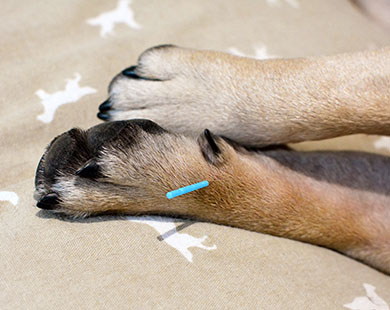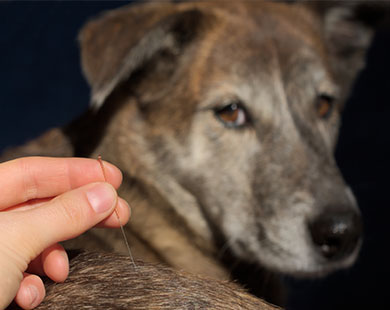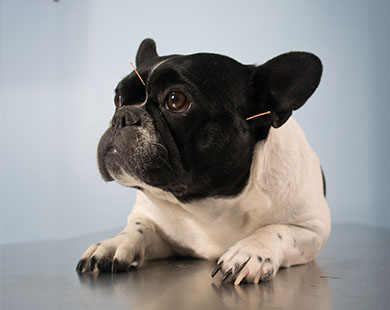Acupuncture
Ease your pet’s pain and help them enjoy a better quality of life

Dr. Woerner and Dr. Powell are trained in acupuncture and their understanding of the depths of Traditional Chinese Medicine has a much deeper and more powerful effect than someone who uses a cookbook approach.
What is Acupuncture? Acupuncture may be defined as the insertion of needles into specific points on the body to cause a desired healing effect. This technique is the most commonly practiced branch of Traditional Chinese Medicine in the United State veterinary practice and has been used in China for at least 3000 years to treat many ailments. Acupuncture is used all over the world, either by itself or in conjunction with Western or Traditional medicine, to treat a wide variety of maladies in every species of domestic and exotic animals. Modern veterinary acupuncturists use solid needles, hypodermic needles, bleeding needles, electricity, heat, massage and low power lasers to stimulate acupuncture points.
For which conditions is acupuncture indicated in small animals? The following are some of the general conditions which may be treated with acupuncture:
Respiratory problems Feline asthma
Chronic pain management Pancreatitis, Gastrointestinal concerns
Geriatric conditions Arthritis, back and/or joint pain
Hospice Improve quality of life and lessen pain
Injuries Age related changes, localized or generalized soreness, post-surgery pain, vertebral disc issues
Skin problems Lick granulomas and allergies
For which conditions is acupuncture indicated in large animals? Acupuncture is again commonly used for functional problems. Some of the general conditions where it might be applied are the following:
Musculoskeletal problems Sore backs
Nervous system problems Facial nerve paralysis
Skin problems Allergic dermatitis
Respiratory problems Heaves and “Bleeders”
Gastrointestinal problems Non-surgical colic
Selected reproductive disorders

How does acupuncture work? Qi is the life energy that flows throughout the body. The Chinese have mapped the pathways, or meridians, through which the Qi flows. When the flow of Qi is abnormal or blocked, this disharmony creates disease. According to ancient Chinese medical philosophy, disease is the result of an imbalance of energy in the body. Acupuncture is believed to balance this energy and, thereby, assist the body to heal disease.
Western science has demonstrated that acupuncture points are points of decreased electrical resistance on the body. There are devices that can be used to locate these points. Acupuncture points correspond with major nerve pathways, nerve-blood vessel junctions, nerve tendon-sheath junctions. Each acupuncture point causes the release of a different set of neurohormones or neurochemicals. It’s like having a computer keyboard with direct access to the neurohormonal system.
There are many different techniques.
- The most commonly used technique is classical needling. Needles are placed and either left in, or twirled. The time and technique depend on whether sedation or stimulation is needed.
- Another technique is electro-acupuncture. Copper needles are placed and attached to an electro-stimulator. A tiny current is allowed to run between needles. This is especially helpful in patients with intervertebral disc disease, wobblers disease, and paralysis.
- Moxa is an herb with warming medicinal properties. Moxa can be burned over the head of placed needles, or directly over acupuncture points. Moxabustion is used in cases whose origin is cold or damp. For example, the arthritic patient who is stiffer when the weather is cold and damp.
Is acupuncture painful? Acupuncture needles are much smaller than those we use for injections, so insertion of acupuncture needles is virtually painless. Most animals become very relaxed and may even become sleepy. Nevertheless, acupuncture treatment may cause some sensation, presumed to be those such as tingles, cramps, or numbness which can occur in humans and which may be uncomfortable to some animals. Usually, after a few minutes, the body begins to release endorphins, and the pet relaxes noticeably. It’s not unheard of for Dr Woerner’s patients to begin to yawn and stretch under treatment. Some even falling asleep with the needles in place.

Is acupuncture safe for animals? Acupuncture is one of the safest forms of medical treatment for animals when it is administered by a properly trained veterinarian. Side effects of acupuncture are rare, but they do exist. An animal’s condition may seem worse for up to 48 hours after a treatment. Other animals may become sleepy or lethargic for 24 hours after acupuncture. These effects are an indication that some physiological changes are developing, and they are most often followed by an improvement in the animal’s condition.
How long do acupuncture treatments last and how often are they given? The length and frequency of acupuncture treatments depends on the condition of the patient and the method of stimulation that is used by the veterinary acupuncturist. Stimulation of an individual acupuncture point may take as little as 10 seconds as much as 30 minutes. A simple acute problem, such as a sprain, may require only one treatment, whereas more severe or chronic ailments may need several or several dozen treatments. When multiple treatments are necessary, they usually begin intensively and are tapered to maximum efficiency. Patients often start with 1-3 treatments per week for 4-6 weeks. A positive, while not complete response is usually seen after the first to third treatments. Once a maximum positive response is achieved (usually after 4-8 treatments), treatments are tapered so that the greatest amount of symptom free time elapses between them. Many animals with chronic conditions can taper off to 2-4 treatments per year.
Acupuncture is very versatile and can be used effectively for most conditions, although it’s not uncommon to have it combined with other remedies. Single therapy or combined therapies may offer your pet the fastest recovery.
